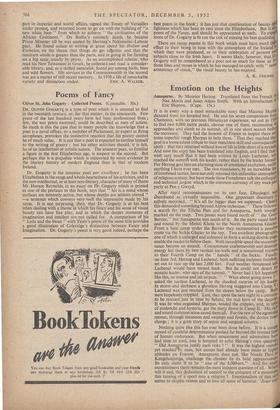Poems of Fancy
Oliver St. John Gogarty : Collected Poems. (Constable. 30s.) Da. OLIVER GOCIARTX, is a type of poet which it is unusual to find in the twentieth century, or, for that matter, in the nineteenth. Few poets of the last hundred years have led busy professional lives ; few, the war poets excepted, could be described as men of action. So much is this the ease that in many people the knowledge that a poet is a naval officer, or a member of Parliament, or expert at flying aeroplanes, provokes the instinctive reaction that his poetry cannot be of much value. It is not that a poet is expected to confine himself to the writing of poetry.; but his other activities should, it is felt, be of an intellectual or artistic nature. The amateur poet, so familiar a figure in the first Elizabethan age, is suspect in the second. But perhaps this is a prejudice which is supported by more evidence in the literary history of modern England than in that of modern Ireland.
Dr. Gogarty is the amateur poet par excellence; he has been Elizabethan in the range and whole-heartedness of his activities, and in the non-intellectual, or at least non-literary, character of many of them. Mr. Horace Reynolds, in an essay on Dr. Gogarty which is printed as one of the prefaces to this book, says that" his is a mind whose surfaces are intensely active, but whose depths are seldom stirred" —a sentence which conveys very well the impression made by his verse. It is not surprising, then, that Dr. Gogarty is at his best when dealing with i theme in which his fancy and his sense of visual beauty can have free play, and in which the deeper resources of imagination and intellect are not called for. A comparison of his "Leda and the Swan "with Yeats's poem of the same title provides a good illustration of Coleridge's distinction between Fancy and Imagination. Dr. Gogarty 's poem is very good indeed, perhaps the
arid
153 PeCt S.
heir d jO
and
Dr. for
best poem in the book ; it has just that combination of beauty lightness which has been so 'rare since the Elizabethans. But it poem of the Fancy, and should be appreciated as such. To e:s more of Dr. Gogarty is to run the risk of missing his best qualitk There are many poems in this book which must have owed effect to their being in tune with the atmosphere of the Irelan which they were produced, or to their celebration of persons subjects close to the Irish heart. It seems likely, however, that Gogarty will be remembered as a poet not so much for these as those lines and verses in which he has managed to catch, 'with'' s aristocracy of vision," the visual beauty he has enjoyed. .
0.
A. K. FEILIN


















































 Previous page
Previous page